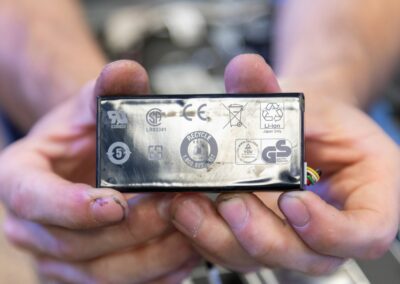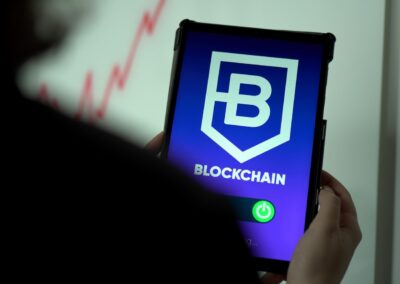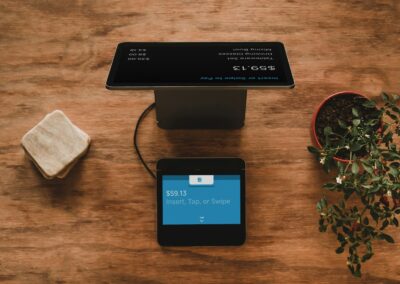Leveraging Blockchain for Social Good
The integration of blockchain technology into various sectors is revolutionizing the way we address social and environmental challenges. With its decentralized, transparent, and secure nature, blockchain is paving the way for innovative solutions that can significantly impact societies globally, including in regions like Saudi Arabia and the UAE. These advancements not only enhance operational efficiency but also foster trust and accountability, essential for driving meaningful change. Business executives, mid-level managers, and entrepreneurs are increasingly recognizing the potential of blockchain to transform traditional practices and create sustainable solutions.
Enhancing Transparency and Trust
One of the primary benefits of blockchain technology is its ability to provide a transparent and immutable ledger of transactions. This feature is particularly beneficial for addressing social challenges, where transparency and trust are paramount. For instance, charitable organizations in Riyadh and Dubai can utilize blockchain to ensure that donations are tracked and utilized effectively. By providing donors with real-time updates on how their contributions are being used, blockchain enhances trust and encourages more significant philanthropic engagement. This level of transparency can also be extended to government and non-profit sectors, ensuring that resources are allocated efficiently and corruption is minimized.
Empowering Decentralized Solutions
Blockchain technology enables the development of decentralized applications (dApps) that operate independently of central authorities. This decentralization is crucial for creating solutions that can address social issues more effectively. In the context of environmental challenges, blockchain can facilitate decentralized energy grids where individuals can trade renewable energy directly. In the UAE, such initiatives are gaining traction, with blockchain being used to manage and optimize energy consumption and production. By empowering communities to manage their resources independently, blockchain fosters innovation and resilience, essential for sustainable development.
Facilitating Access to Essential Services
Blockchain technology can also play a pivotal role in enhancing access to essential services such as healthcare and education. In Saudi Arabia, for example, blockchain is being explored to create secure and transparent health records, ensuring that patients receive timely and accurate care. Similarly, blockchain-based educational platforms can provide verifiable credentials, making it easier for individuals to prove their qualifications and access job opportunities. These applications not only improve service delivery but also ensure that marginalized communities have equitable access to critical resources.
Promoting Sustainable Practices
Environmental sustainability is a pressing global challenge that requires innovative solutions. Blockchain technology offers unique capabilities to promote sustainable practices across various industries. For instance, in the agriculture sector, blockchain can be used to track the supply chain of products, ensuring that they are sourced sustainably. This traceability is particularly relevant in regions like Dubai, where there is a growing emphasis on sustainable consumption. By providing consumers with transparent information about the origin and environmental impact of products, blockchain encourages more responsible purchasing decisions.
Optimizing Resource Management
Effective resource management is critical for addressing environmental challenges. Blockchain technology can optimize the management of natural resources by providing a transparent and secure platform for tracking their use. In the UAE, blockchain is being used to monitor water usage, ensuring that this precious resource is managed sustainably. By leveraging blockchain, authorities can gain real-time insights into resource consumption patterns and implement measures to reduce wastage. This technology-driven approach to resource management not only conserves the environment but also enhances the efficiency of resource utilization.
Incentivizing Green Initiatives
Blockchain can also be instrumental in incentivizing green initiatives by creating new economic models that reward sustainable behavior. For example, blockchain-based platforms can issue tokens for activities such as recycling or using renewable energy. These tokens can then be traded or used to access various services, creating a tangible incentive for individuals and businesses to adopt environmentally friendly practices. In Riyadh, such blockchain initiatives are being explored to promote urban sustainability and reduce the carbon footprint of the city. By aligning economic incentives with environmental goals, blockchain fosters a culture of sustainability that is essential for long-term ecological balance.
#Blockchain #Technology #SocialChallenges #EnvironmentalChallenges #SaudiArabia #UAE #Riyadh #Dubai #ChangeManagement #ExecutiveCoaching #EffectiveCommunication #BusinessSuccess #ManagementConsulting #ArtificialIntelligence #TheMetaverse #GenerativeAI #LeadershipSkills #ProjectManagement























